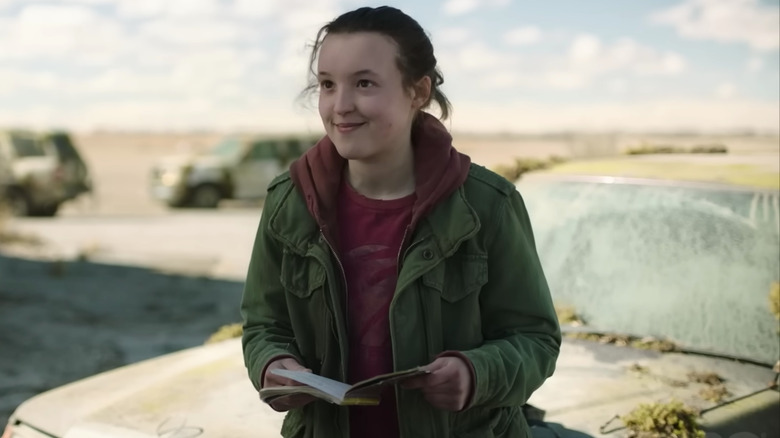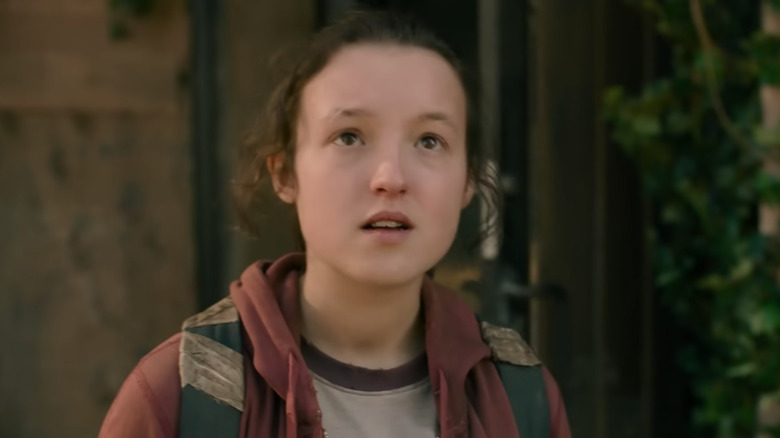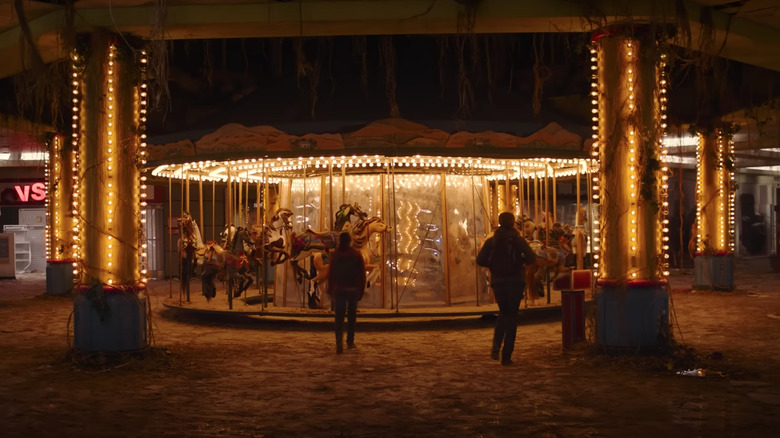Ellie's Joke Book In The Last Of Us Episode 4 Has A Deeper Meaning
"Did you know diarrhea is hereditary?" As Ellie (Bella Ramsey) told Joel (Pedro Pascal) in the latest episode of "The Last of Us," "it runs in your jeans." "No Pun Intended: Volume Too," written by Will Livingston, is a hilarious and beloved artifact in the original video game that was faithfully recreated in the hit HBO series. In Episode 4, "Please Hold My Hand," Ellie cuts the gripping tension with chuckle-worthy dad jokes that even Joel can't help but laugh at.
Neil Druckmann, the creator of both installments of "The Last of Us" games, plays an integral part in the live-action series as well. He serves as the co-creator, and shares writer/director responsibilities with his talented team, including Craig Mazin. This results in an authentic recreation with plenty of easter eggs gamers will surely enjoy. One, in particular, is Ellie's silly pun book, which has an even deeper meaning outside its video game roots.
The co-creators took to HBO's "The Last of Us" companion podcast to explain why this detail is so important. Mazin outlines how it characterizes Ellie and adds a welcome moment of levity to the suspenseful series. Fans of the video game may even remember the heartbreaking origins of this punny book.
It emphasizes Ellie's youth despite her grim circumstances
Each week, the co-creators of HBO's "The Last of Us" sit down to discuss the process behind the latest captivating episode. This week, they explore the fortified emotional walls Joel puts up to protect himself and the way Ellie chisels away them with humor and innocence. We see this exceptionally through her joke book, which also underlines a fundamental part of her character.
Mazin prefaces by sharing how moved he was by the game's use of the book and how it allows Ellie a small moment to still be a kid in this deadly world. He also points out how authentic it feels for Ellie and applauds the writing (at the 4:20 mark), "What else I love about it and why it was essential to include in the show is that it undercuts this thing that happens when adults write kids. They either write them too young or too old." Mazin adds how this perfect balance when writing Ellie retains her childlike wonder, which is exemplified through her love of puns, "I love how Ellie has this joy for something so juvenile... It's honest joy."
It was extremely important for the creators to include the prop as they put their heads together, "One of the things Neil and I, as we talked about including it, thought 'what can we do with this joke book?" They landed on a devastating juxtaposition, which pits Ellie's determined grit against her heart and young age.
It's also a relic of Ellie's traumatic past
As fans of the video game know, we'll presumably see how Ellie gets this playful collection of jokes in a future episode. In the downloadable content following "The Last of Us: Part I," we learn how Ellie was infected and the role her dear friend Riley (Storm Reid) played in that horrifying moment. In "Left Behind," Ellie's childhood is irrevocably changed in a tale about finding light in the darkness.
The creators outline how the contents of Ellie's bag highlight this theme by depicting the conflicting forces, "in her [Ellie's] backpack, she has a pun book and a weapon." It also serves as a metaphor for her relationship with the reluctant Joel, who grows less gruff over time, "it's this cool opportunity where we show that these things are getting mixed up." Joel begrudgingly cracks a smile over Ellie's potty humor, which strengthens their relationship over time, especially after she saves his life.
This event solidifies the parallel by showing the look of horror on Ellie's face after she shoots Bryan (Juan Magana). While Joel doesn't console her in the moment, he spares her from further acts of violence in a fatherly way. That harrowing sequence elevates Ellie's joke book into something much more profound, which adds depth and complexity to her character.


